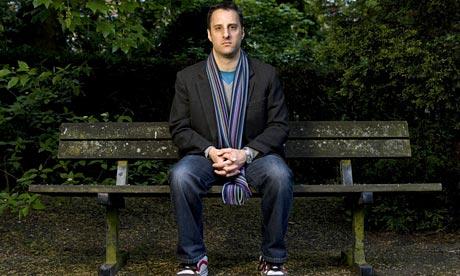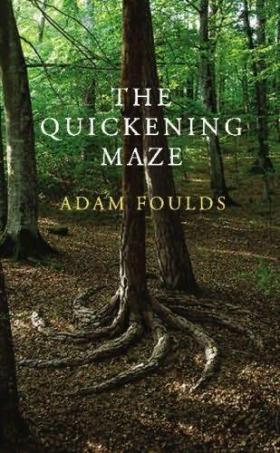Foraging into the labyrinth of lunacy

An incredibly subtle work which reveals much about the human condition, Adam Foulds's second novel about the poets John Clare and Alfred Tennyson is a tour de force of sustained imaginative power. By Edward O’Hare.
Love, genius and madness are the themes of Adam Foulds second novel, a work whose tender, delicate prose holds within it a galaxy of complex thought, powerful emotions and human truths. Set in the Forest of Epping near London around 1840, The Quickening Maze concerns the fortunes of Dr. Matthew Allen, chemist, phrenologist, philosopher, and the doctor in charge of High Beach Asylum, a shelter for the insane which Allen runs on his own enlightened, reformist precepts.
An autodidact with a vast, inquiring mind, Dr. Allen has become a wealthy and influential figure. He has built a fine home for himself and his large family. But he wants more. No longer finding attending to the needs of the insane a sufficient stimulant for his roving intellect, Dr. Allen conceives a new business scheme which he is convinced will make him one of the richest men in the country. Risking everything, he sets about developing a machine to change the very face of the earth.
(Picture: Adam Foulds)
The Quickening Maze is also the story of two poets at the opposite ends of their lives, Alfred Tennyson, Britain’s future Poet Laureate, and John Clare, one of the great recorders of the rapidly vanishing English countryside. The young Tennyson has come to stay in Epping to entrust his melancholic brother into Allen’s care but his real ambition is to escape the terrible grief caused by the death of his friend Arthur Hallam and rediscover his lost inspiration. Clare, the so-called ‘Peasant Poet’ and once the toast of literary society, is succumbing to drink and depression and has been incarcerated in High Beach. Cut off from his wife and children and the natural kingdom that once nourished his soul, he now drifts ever deeper into the labyrinth of his lunacy.
Gradually the lives of Foulds's characters begin to touch each other. Dr Allen seeks Tennyson’s investment in his machine while Hannah, his lonely daughter, hopes to win the heart of the dashing if aloof poet. Allen also enlists the help of an engineer, Thomas Rawnsley, whose awkward but sincere love finds its object in Hannah. Together Allen and Rawnsley construct the machine, a mechanical device for automatically reproducing woodcarving, but their reckless dreams quickly lead to a crisis. Meanwhile, Clare’s repeated roaming beyond the grounds of the Asylum to visit to a gypsy encampment see him fall victim to Allen’s sadistic assistants, who take pleasure in placing the gentle, child-like poet in solitary confinement. Without so much as a light to see by, his identity begins to collapse. Soon his only hope of salvation rests on returning home.
 For a 33 year old writer The Quickening Maze is a colossal achievement. Foulds has an extraordinary talent for characterization. Whether describing the inner lives of the Allens, the two poets or even his minor characters like Margaret, an inmate who sees angels and the divine workings of the universe, or the heartbroken aristocrat Charles Seymour, his creations instantly emerge from the page as complete beings, entire in themselves. Each has a mind, heart and voice of their own. Like wild flowers, he allows their stories a space, a vital distance, to unfold to their full, beautiful effect. Moreover, he has that all-important novelistic nous for recognizing the value of the unsaid, the potency of implication. The novel is a sequence of short, simple scenes, with the most dramatic moments bravely entrusted to the reader’s imagination.
For a 33 year old writer The Quickening Maze is a colossal achievement. Foulds has an extraordinary talent for characterization. Whether describing the inner lives of the Allens, the two poets or even his minor characters like Margaret, an inmate who sees angels and the divine workings of the universe, or the heartbroken aristocrat Charles Seymour, his creations instantly emerge from the page as complete beings, entire in themselves. Each has a mind, heart and voice of their own. Like wild flowers, he allows their stories a space, a vital distance, to unfold to their full, beautiful effect. Moreover, he has that all-important novelistic nous for recognizing the value of the unsaid, the potency of implication. The novel is a sequence of short, simple scenes, with the most dramatic moments bravely entrusted to the reader’s imagination.
Just as astounding is Foulds's ability with language. A published poet, his prose dances to a unique and glorious melody and every sentence glitters with gemstones. Foulds's attunement to the natural world, his ability to see farther, plunge deeper and become absolutely absorbed in its vast, everlasting harmony, to appreciate the patterns and cycles of life which today mostly go unseen, makes The Quickening Maze a humbling celebration of the planet which is a home to all of us. This is a novel about two great poets written by a novelist with poetic powers of perception equal to theirs in every way.
A brief, simple story in which the universal predicament of mankind can be seen, The Quickening Maze is a literary novel set apart from most by its capacity to be frequently and often unbearably moving. It is a book which reveals much about our primal relationship with the earth, the quiet disappointments and tragedies which make up life for most people, the cruelty and folly which can destroy us so quickly, the limitless reach of the imagination, the resilience of faith and the precariousness of our hold on reality. Already awarded several major prizes, this novel confirms Adam Foulds as one of the most brilliant young authors to appear in recent times. A truly beautiful novel, The Quickening Maze is a work of the highest ability that will linger long in the memory and in the heart.
The Quickening Maze by Adam Foulds
Jonathan Cape PP 258
EURO: 16
